选修七unit5 小课文
- 格式:doc
- 大小:59.50 KB
- 文档页数:4

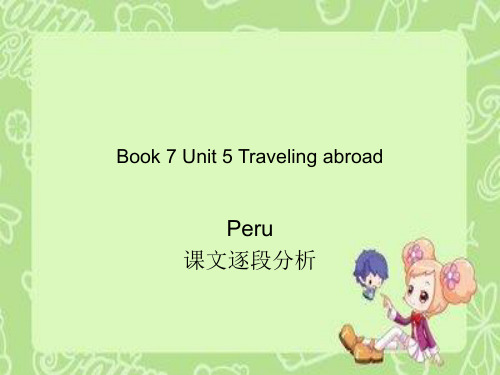
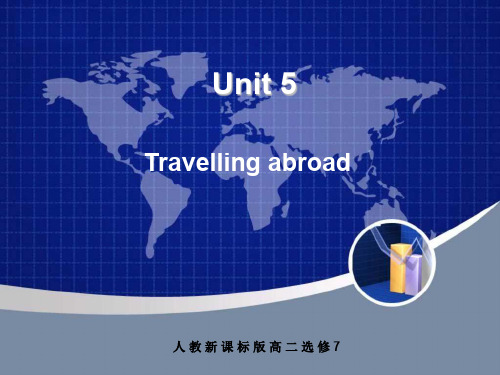

Unit 1 Living well Reading MARTY’S STORY 马蒂的故事你好,我叫马蒂·菲尔丁。
我想你可能会说我是“百万人中才有一个”的那种人。
换句话说,世界上像我这样的人并不多见。
你瞧,我的肌肉有毛病,使我的身体非常虚弱,所以我不能向别人那样快跑或快步爬楼梯。
另外,有时候我还会笨手笨脚、不小心摔掉东西,或磕碰到家具上。
不幸的是,医生们不知道如何治好我的病,但是我很开朗乐观,学会了适应身体的残疾。
我的座右铭是:活一天算一天。
十岁以前,我跟其他人是一样的。
我常常爬树、游泳、踢足球。
说实在的,我过去常常梦想我会成为职业球员,代表我的国家参加世界杯足球赛。
后来,我的身体开始变得越来越虚弱,以至于只能坐在体育场的长凳上欣赏足球了。
最后我到医院去做了检查,住了将近三个月的医院。
我想我至少做过十亿次检查了,包括有一次检查,他们从我的腿部切下一小块儿肌肉,放在显微镜下观察。
即使做过了所有这些检查,也没有人能够确诊这个病。
因此,很难知道将来会是个什么样子。
问题是我看上去跟平常人一样,因此,当我跑了很短的一段路之后,就喘不过气来,或者爬楼梯才爬到一半就得停下来休息,我的小学同学就会笑我。
有时候我的身体太虚弱,上不了学,因此落下了许多功课。
每次缺课之后,我就觉得自己很笨,因为我比别人落后了。
我在中学时期的生活(比在小学时)要轻松多了,因为我的同学已经接受了我的状况。
还有少数同学看不到我的内心世界,但是我并不生气,只是不去理会他们罢了。
总而言之,我生活得挺好。
我很高兴我能做许多事情,比如写作和电脑编程。
我有雄心壮志,长大后我要在开发电脑软件的公司里工作。
去年我开发了一个电脑足球游戏,有一家大公司已经决定从我这儿买走。
我的生活很充实,没有时间坐着顾影自怜。
除了同我的朋友一起去看电影和足球比赛外,我还花很多时间和我的宠物在一起。
我有两只兔子、一只鹦鹉,一缸金鱼和一只乌龟。
我得花大量时间来照顾这些宠物,但我觉得很值。
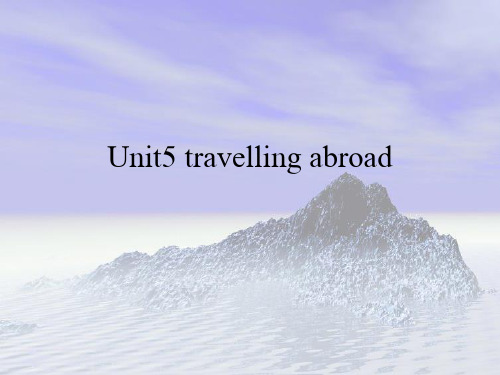
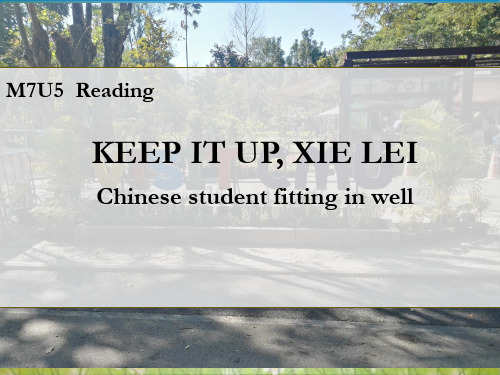

Unit 5 Travelling abroadThe First Period SpeakingStepⅠWarming upLet the students talk about the questions in Warming Up.T: Did you watch the TV series about four Chinese students who live and study in Canada? ... How will you describe their life there? Do you want to study abroad like them?S: I watched it on the CCTV. They are about our age, so I enjoyed watching it. I think life in a foreign country is very interesting and challenging. You can make friends with people there and learn about different culture and customs.S: I want to study abroad. I think living in a different country will enrich my knowledge and make me independent. Because you have to deal with many things by yourself. You will learn to solve problems and take care of yourself. T hat’s really exciting!T: Yes, travelling abroad and studying abroad are very popular nowadays, as many people can afford to travel and study in a foreign country. If you could go anywhere in the world, which country would you like to visit and why? Turn to Page 37. Work in groups, discuss and answer the questions in Warming Up.After discussion, ask several students to report their answers to the class.T: What’s your answer to the first question?S1: If I have a chance to travel abroad, I’d like to visit New Zealand. It’s said that it’s a beautiful country. I’d like to enjoy the beautiful scenery in New Zealand.S2: If I have a chance, I’d like to go to America. Maybe it is better if I could work or study there, then I could learn English well. I like Ame rican English. I think it’s the best place for me to learn English. What’s more I want to visit some tour attractions such as Disneyland, Statue of Liberty, Times Square etc.S3: I’d like to go to Egypt, because it has a long history and I want to know a bout the ancient culture. There I can visit Pyramid and Aswan High Dam.S4: I prefer to go to Cambodia, because it’s an old Country. I especially want to visit Angkor Wat in Cambodia(柬埔寨吴哥窟).T: Then, what kind of things would you learn best by being a tourist in the country you talked about and what would you learn best by working or studying there?S: When we travel to another country, maybe we could learn about the architecture of the country, the beautiful scenery, the economic situation and so on.S: When we work or study in the country, maybe we could know more about the culture and customs of the country. We could learn English better, we could communicate with the local people to improve our English.T: Suppose you are going to spend two years in America, how difficult or easy do you think it is to adjust to living there? What kind of difficulties might you experience?S: I don’t think it would be difficult to adjust to living there. Because I have learned English for many years and communication won’t be a big problem. I have learned a lot about Americanculture and customs from movies, books and TV programs. I think Americans are open, friendly and easy to live with.T: Very good. Have you talked to anyone who has spent some time in another country? What did they find unusual or difficult about it?S: Well, I once talked to my friend who had been to India. He told me something different or interesting there. For example, in India, most people don’t eat meat, especial beef. They like to eat vegetables and fruits, so if you invite an Indian for dinner, never order steak for them.StepⅡSpeaking taskDeal with SPEAKING TASK in the workbook. Let the students practice expressing probability and improbability.T: Well, we talked about the things that we could learn while travelling or studying in a foreign country. Then, what kind of problems or dangers could happen while travelling in a foreign country? Now list the dangers and problems on a piece of paper.Possible problems and dangers:have difficulty in communicating with the local people; lose your way; get robbed; have your money stolen; traffic accident; get sick; race discrimination ...Let the students speak out the problems and dangers they have written and write all of them on the Bb.T: Now look at the list on the Bb and discuss which situations could possibly happen and which are very unlikely to happen. You can use the expression_r_rs in Activity 2 in your discussion. Let’s go through the expression_r_rs first.After discussion, let the students rank the situations on their lists 1-3 from unlikely to very possible.T: Now look at the situations you have ranked 2 and 3. How would you prevent these situations happening when you are travelling in a foreign country? Discuss with your partners. Before you start, read the example in Activity 4.After a few minutes, ask some students to present their ideas to the class.T: Well, are you ready? Who’d like to share your ideas with us?S: While travelling, it’s possible that you lose your way, because you don’t know the country very well. To prevent this:You’d better take a map of the coun try with you.Don’t leave alone without saying a word.Pay attention to the notable signs, for example, some famous buildings, some special road signs, so that you can ask the way while you are lost.S: It’s likely that we could meet malefactors—robber, thief or others. Probably, we will get hurt. To prevent this:Don’t show your valuable belongings to others.You’d better go along with other people.Should you face dangers, call the police.S: It’s (very) possible that we could have difficulty in communica ting with the local people. To prevent this:Try to learn some simple and basic local language.Try to know about the manners and customs of the country.Try to get familiar with formality in everyday life.StepⅢTalkingDeal with TALKING in the workbook.T: It’s very important to know how to deal with the problems while travelling in a foreign country. It is important to make good preparations before you go there. Here is a question: How do you find information that is helpful for your trip? Think about it.S: We could go to some travel agency for information. They can provide the most useful and complete information.S: I would search on the Internet for some information. There are many websites which provide information on travelling both home and abroad. You could also visit some of their forums. The web pals are willing to offer their advice and ideas.T: Good ideas! If you don’t have much money for an overseas trip, how would you arrange your trip?S: Maybe we could travel on foot or by bike.S: We could stay at inexpensive small hotels. But the conditions may not be satisfactory.T: Nowadays many young people manage to travel around the world with limited amount of money. The youth hostels make it possible. Have you heard about it? What kind of service do they offer? Let’s find more information about it. Turn to Page 78. Mei Jie is planning a three-week holiday in Italy and France. She has been using the Internet to find out information for her trip. Look at the web page. It is from the web site where she searched for information. Read the web page carefully and discuss the question in groups.About 5 minutes later. Ask the students to answer he questions.Suggested answers:1. They are cheap. They offer quality accommodation at low cost.2. 4, 5, or 6 people.3. You can save money by cooking for yourself instead of eating in restaurants. You can eat food that you like.4. If you have a Youthpass you can t ravel in European contries at cheap prices.5. You must be less than 26years old.6. If you get sick or have an accident in a foreign country, it can be quite expensive to get medical treatment.7. Various answers are possible.Well, I would like to stay in a youth hostel. Because I like travelling alone, I like to enjoy the feeling of freedom. I can do whatever I like. Also, it’s convenient for travellers to stay in youth hostel.StepⅣHomeworkPreview the reading passage on Page 38. Look up the new words in the dictionary.The Second Period ReadingTeaching goals教学目标1. Target language目标语言a. 重点词汇和短语keep it up, fit in, cafeteria, lecture, qualification, preparation, recommend, get use to, shopkeeper, comfort, substitute, academic, requirement, essay, tutor, numb, acknowledge, as far as one is concerned, occupy, hopefully, enterprise, succeedb. 重点句子Xie Lei, who is 21 years old, has come to our university to study for a business qualification.It’s not just study that’s difficult. You have to get used to a whole new way of life, which can take up all your concentration in the beginning.I have been so occupied with work that I haven’t had time for social activities.I’m going to join a few clubs. Hopefully I’ll make some new friends.2. Ability goals能力目标Enable the students to learn about Xie Lei’s school life in London.3. Learning ability goals 学能目标Help the students learn how to deal with the problems that they would face when studying in a foreign country.Teaching important and difficult points 教学重难点Help the students to summarize the benefits and difficulties of living in a foreign country.Teaching procedures && ways教学过程与方式StepⅠRevisionT: Yesterday we talked about travelling in a foreign country. Have you ever travelled in another country? Who’d like to tell us your experiences?S: I’d like to. Last summer, my parents and I went to Pairs. We went there by air. Though it’s expensive, it’s very comfortable to travel by air. The first day we arrived there, we found a good guide. She introduced a wonderful hotel to us, and helped us to change money. During the travel, we visited the Eiffel Tower and Arc de Triomphe (凯旋门). I took some photos and bought a postcard and sent it to my best friend. We also visited the Musee du Louvre(卢浮宫)and Avenue des Champs Elysees (香榭大道). We bought many presents. There are so many beautiful and famous tourist attractions in Paris. I hope you will have a chance to visit it.S: I had the experience of travelling in America. It was in 2000 that my uncle took me to visit the Disneyland. We spent a wonderful day in Disneyland. I took many photos with the famous cartoon characters, for example, Snow White and the Seven Dwarfs, Mickey Mouse, Winnie the Pooh(小熊维尼). We visited the four wonderful theme parks in Disneyland. We were so happy,but unfortunately, we lost our way and couldn’t find the entrance. We couldn’t speak English, so others couldn’t understand us. Finally, we met a Chinese guide. With her help, we went back to our car.T: Poor boy! So you know, we might meet many kinds of difficulties while travelling in a foreign country.StepⅡPre-readingTalk about studying in a foreign country. First present two pieces of news to start the topic.Show the news on the screen.NEWS 1On Dec 6th 2005, two Chinese overseas students were killed in Ottawa, Canada. They were shot at a bar, one was shot dead at once, the other died during the way to the hospital. It was said that the murderer were Vietnamese.T: I read the two pieces of news recently. What can you learn from the news?S: We can get the information that we may meet some security problems while studying in a foreign country.T: Yes. As we know, now more and more people live or study abroad, even some senior or junior high school students are sent to study abroad. Do you know why?S: I think they want to learn more advanced technology, know more different cultures and customs; they want to enlarge their knowledge and improve their ability.T: Besides the security problems, what are other problems that they might meet in their study and daily life? Today let’s learn a text about a Chinese girl studying in London. First, please turn to Page 37, look at the pictures and discuss the questions above them.After discussion.StepⅢWhile-readingGet the students to comprehend the passage quickly and accurately, meanwhile help the students to form a good habit of reading.T: Now please skim the passage fast to obtain a general understanding of the whole passage. While reading, try to find out the main idea of each paragraph.Several minutes later, ask the students to talk about the main idea of each paragraph. At the same time, show the suggested main ideas on the screen.Main idea of each paragraph:Para.1: Xie Lei, a Chinese girl, is studying in a foreign country — London.Para.2: General introduction to Xie Lei and her study.Para.3: The difficulties Xie Lei met while living in London.Para.4: The advantages of living with a host family.Para.5: Xie Lei is getting used to the Western Univer sity’s way of learning.Para.6: Xie Lei feels much more at home in England now and is living an active life.Para.7: The newspaper will follow Xie Lei’s progress in later editions.Suggested answers:1. She is serious about her work. The evidence is:She did research on the Internet for her essay.When her tutor did not give her a good mark she went to see him to find out why.She put her tutor’s ideas into practice.2. She perseveres. The evidence is:She had problems when she first arrived, but worked at them till she succeeded in getting over them.She asks her host family for help with any language or culture issues.She did not give up with her first setback over the essay.3. She is enterprising and adaptable. The evidence is:She left her city to go to England even though she had never travelled abroad before.She settled down well enough to feel at home in a strange country.T: OK. We have already talked about the difficulties and benefits of studying in a foreign country. Now, let’s list the problems that Xie Lei had when she first went to England, and try to add two or three other problems that she might have and summarize what you would do if you had the same problems. Work in groups.Possible problems and solutions:StepⅤHomeworkT: Suppose you are Xie Lei, write a letter to your parents or friends in China, telling them about your present life according to what you have learned from the text.The Third Period Listening and speakingTeaching goals 教学目标1. Target language目标语言a. 重点词汇和短语agent, travel, parallel, abundant, govern, destinationb. 功能句式We could ...You might ...It would be possible to ...It isn’t possible to ...... would be a perfect place for us.I don’t think you’d enjoy ...... would probably suit us.2. Ability goals能力目标Through listening, enable the students to acquire detailed information about Peru.Enable the students to express likes and dislikes, probability and improbability with the target language.3. Learning ability goals学能目标Help the students learn how to get detailed information about Peru through listening.Help the students learn how to express likes and dislikes, probability and improbability with the target language.Teaching important and difficult points 教学重难点Talk about tours in and around Cuzco with functional items given.Teaching methods 教学方法Listening, reading and speaking.Teaching aids 教具准备A slide projector and a tape recorder.Teaching procedures && ways 教学过程与方式StepⅠRevisionT: At the end of last period, you were asked to write a letter. Now I’d like two of you to read your letters. Any volunteer?Let two students read their letters to the class.StepⅡListeningDeal with Listening in Using Language.T: Today, we’ll travel to Peru. First, let’s look at the map of South America on Page 42, find the cities of Lima and Cuzco and the Andes Mountains. Who can describe their locations according to the map?S: Let me try. Lima, the capital of Peru, lies in the north on the Pacific coast.S: Cuzco is in the Andes Mountains, it is a popular tourist destination.S: Andes Mountains runs parallel to the Pacific coast.T: Very good. Now Lia wants to visit Peru. She goes to a travel agent to find out the best way to travel there. Let’s listen to a conversation between Lia and a travel agent and try to know more about Peru. Before you listen, go through the things listed in Exercise 2 on Page 41. Then listen and tick the things Lia says she likes doing.Play the tape. Then check the answers.Play the tape again, and deal with Exercises 3-4 on Page 42. If necessary, play the tape several times.StepⅢReadingT: OK. After listening, we have known about Lia’s travel plan. Would you like to take a tour there?Ss: Yes!T: Before you go, let’s learn something about this country. Now look at the reading passage in Reading and speaking. Read the text and underline the places mentioned in it.The students are supposed to underline: coastal belt, the Andes Mountains, high flat plains, Lake Titicaca, Lima, Cuzco, Machu Picchu.Then let the students find answers to the questions below the text.Several minutes later.First show the following expression_r_rs on the Bb.I like / don’t like doing /to do ...I prefer to ...I enjoy / love / hate doing ...StepⅤHomework。
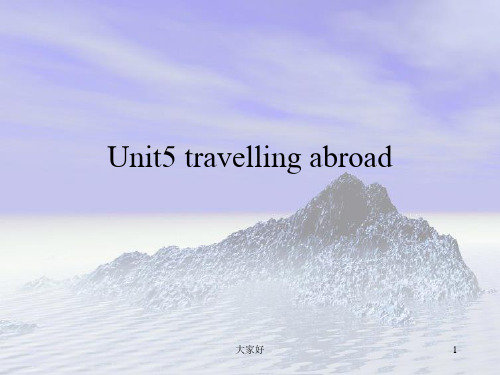
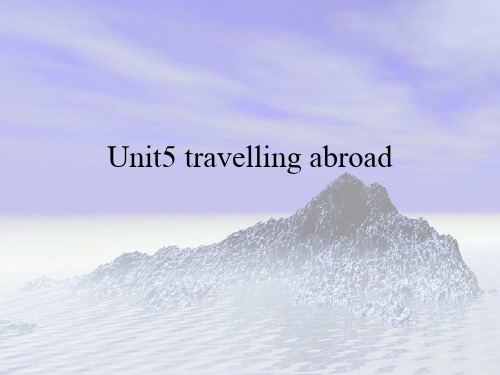
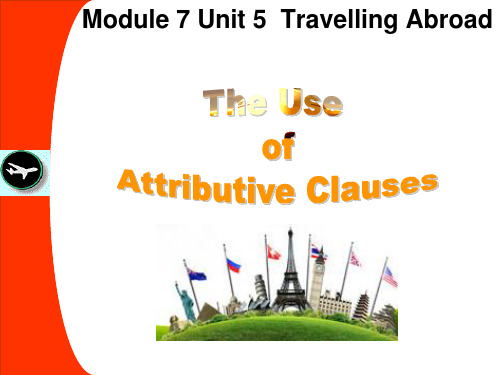


人教版英语选修七第五单元课文翻译Unit 5 中国学生适应能力强六个月之前,谢蕾告别了她在中国的家人和朋友,登上了前往伦敦的飞机。
这是她第一次离开自己的祖国。
课间休息时我在学生餐厅碰见谢蕾,她告诉我的说,“我很激动,因为很久以前就梦想着能有这么一天,但是我又非常紧张,因为我不知道我所期望的是什么。
”谢蕾今年21岁,来我们大学上学,希望获得工商管理证书。
大多数外籍学生在进入学位课程学习之前都要学一年预科,而谢蕾已经读完半年了。
她非常看重预科课程。
她说,“预科课程非常有益。
在这儿学习跟在中国学习是相当不同的。
你必须事先做好准备,或者在这里,或在中国。
”“困难不仅仅是在学习方面,你还必须习惯一种全新的生活方式,在一开始的时候这就会占去你的全部注意力。
”她说,“有时候我觉得自己像个小孩似的,我得学习如何使用电话,乘公交车时该怎样付款,在商店买东西时如果不知道商品的英文名字时,又怎样问店主。
当我迷路不得不向路人问路时,经常听不懂他们说的话。
他们说的话不像我们在听力磁带上听到的那样。
”谢蕾说着笑了。
谢蕾同房东一家人住在一起,他们给了她许多建议。
虽然有些外国学生同其他同学一起住在学生宿舍或公寓房里,但有些学生选择寄宿在英国人的家中。
有的房东家也有上大学的孩子,跟这样的人住在一起会给外国学生提供机会,更好地了解这个国家的日常生活和风俗习惯。
“当我听到不理解的话语,或看到似乎有人干了很奇怪的事情时,我就可以向房东家里的人请教。
”谢蕾解释说。
“还有,当我想家的时候,房东家就是我家的替身,给了我很大的安慰。
”谢蕾的预科课程还帮助她熟悉了西方大学里在学术方面的要求。
她对我说,“还记得我交给老师第一篇论文。
我在网上找到一篇文章,看来和我所需要的信息恰好一样。
于是我就那篇论文写了一篇类似小结性的文章,交给了老师。
我原以为我会得到高分,结果只得了一个E。
我非常吃惊,于是去找导师说理。
”他告诉我说,首先,我不能把别人的话写下来不表示感谢。
